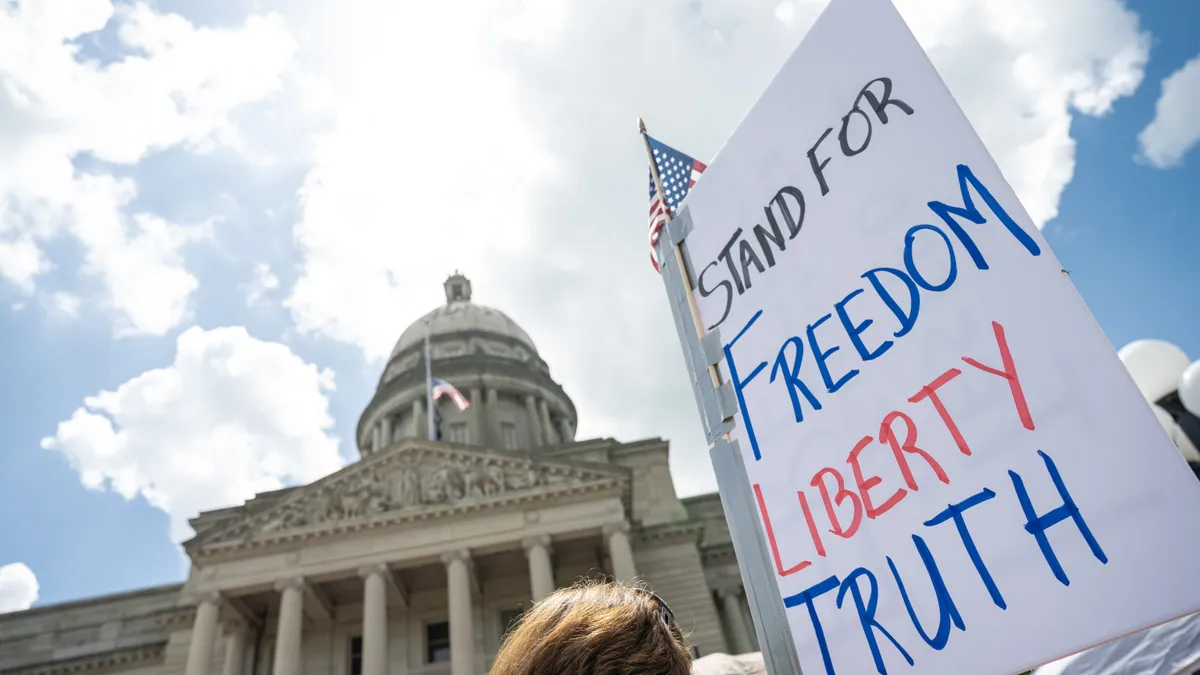Dive Brief:
-
Teachers and parents in New Hampshire filed a lawsuit Monday against the state challenging its six-month-old “Divisive Concepts Statute,” which plaintiffs say prevents teachers from discussing racism’s impact and deprives students of their right to an adequate education. The law allows the State Board of Education to terminate teachers found in violation and revoke their teaching licenses.
-
The suit says the law’s vague nature has led to targeting of teachers by politically motivated bounty hunters, or community members offering money in exchange for tips on teachers accused of violating the legislation. It also comes on the heels of a webpage published by the state commissioner of education, Frank Edelblut, meant for parents to file complaints against teachers who allegedly teach discriminatory lessons.
-
“Nothing in this language [of the statute] prevents schools from teaching any aspect of American history, such as teaching about racism, sexism, or slavery — it simply ensures that children will not be discriminated against on the basis of race, gender, sexual identity, or religion,” said Gov. Chris Sununu, responding to the lawsuit’s allegations in a statement emailed to K-12 Dive.
We've got $500 for the person that first successfully catches a public school teacher breaking this law.
— Moms for Liberty NH (@Moms4LibertyNH) November 12, 2021
Students, parents, teachers, school staff... We want to know! We will pledge anonymity if you want. https://t.co/hA7fqvj62u
Dive Insight:
The lawsuit is among the first of its kind since states, many of them red, began passing laws designed to limit classroom discussions of race and bias, which right-leaning legislators and parents say are divisive. Another was filed in Oklahoma by the American Civil Liberties Union in October, challenging similar legislation in that state.
Often, such laws target what has in many cases been dubbed as “critical race theory,” which is an academic concept that America has a history of institutionalized racism and persistent racial inequality, and is not commonly taught until postsecondary education.
Just this week, Florida Republican Gov. Ron DeSantis proposed the Stop W.O.K.E. Act, or Stop the Wrongs to Our Kids and Employees Act, aimed at curbing similar efforts in schools by codifying the Florida Department of Education’s pre-existing prohibition on teaching critical race theory.
“In Florida we are taking a stand against the state-sanctioned racism that is critical race theory,” said Governor Ron DeSantis in a statement Wednesday. “We won’t allow Florida tax dollars to be spent teaching kids to hate our country or to hate each other.”
However, 96% of teachers said they were not being directed to teach the concept in a 2021 survey of 1,136 educators from the Association of American Educators, a national nonpartisan professional educator organization.
According to the Brookings Institution, a research group and think tank, nine states – Idaho, Oklahoma, Tennessee, Texas, Iowa, New Hampshire, South Carolina, Arizona, and North Dakota – have passed similar legislation. Arizona’s was overturned by the state supreme court and only two, North Dakota and Idaho, explicitly mention “critical race theory.” Twenty additional states have introduced or plan to introduce similar legislation, according to Brookings’ latest count in November.
In New Hampshire, the passed legislation mentions it should not “be construed to prohibit discussing, as part of a larger course of academic instruction, the historical existence of ideas and subjects,” including race. An earlier iteration of the bill, which Sununu threatened to veto if passed, financially penalized public employees for teaching “divisive concepts” around race and sex.
The American Federation of Teachers, which is backing the lawsuit, says the allegedly vague wording in the current legislation and related guidance released by the state creates room for confusion, especially when discussing movements such as Black Lives Matter or history including Nazi philosophy.
“This law has created fear among teachers who are not actually violating any New Hampshire law, but fear they could be targeted without evidence by people with a political agenda,” said Deb Howes, president of the organization’s New Hampshire chapter, in a statement. “Educators are terrified of losing their teaching license over simply trying to teach.”
Since the law was passed, many teachers and legal counsel have been in close contact, said Meghan Glynn, a New Hampshire education attorney with experience in student rights and employee discipline.
Glynn added it could be “a while” until the lawsuit is decided, as defendants still have a month to respond. In the meantime, she suggests teachers and administrators closely review curriculum “to identify areas that could be potentially sensitive and to be prepared to deal with the conversations that might arise as a result” of particular topics, especially slavery in U.S. history.
It’s possible the lawsuit will also have significance in other states with similar legislation. “I think that it is clear that this issue is not going away anytime soon and so if courts are providing clarity on New Hampshire’s statute, then perhaps that will help other courts interpret their own state laws,” Glynn said.










